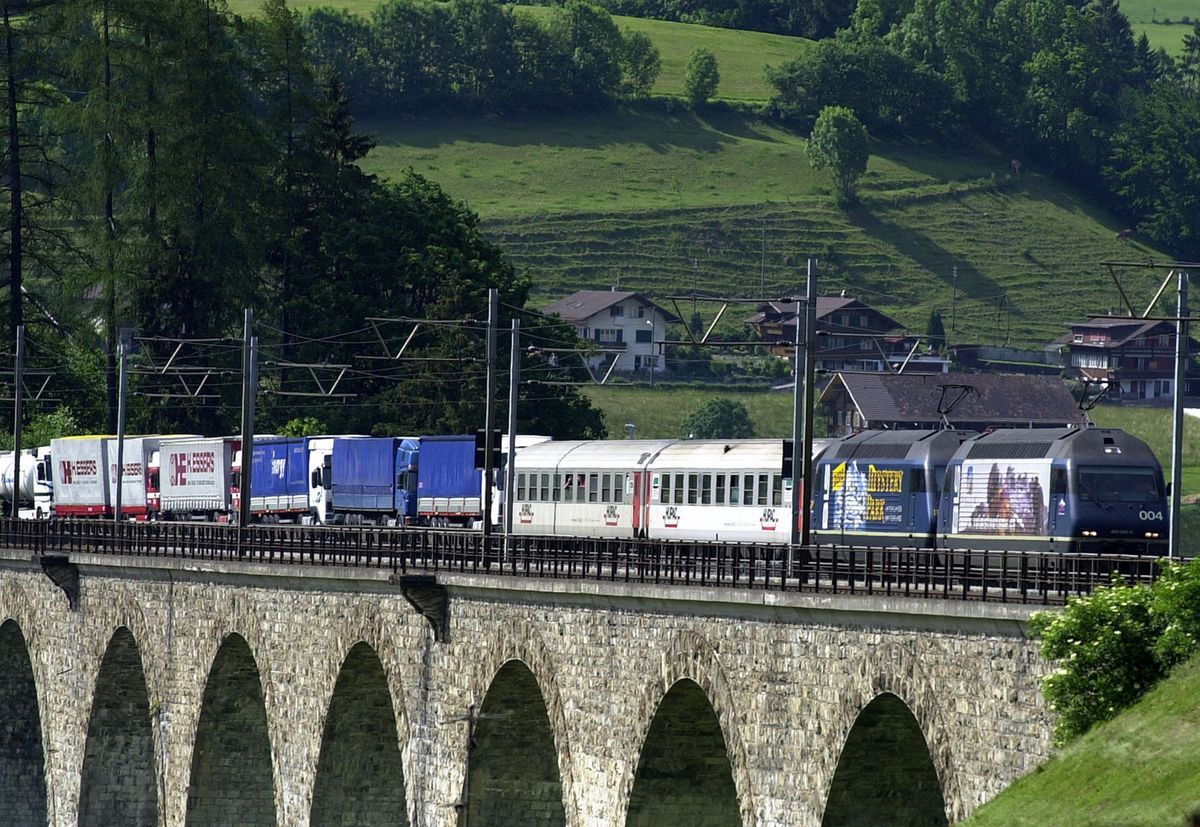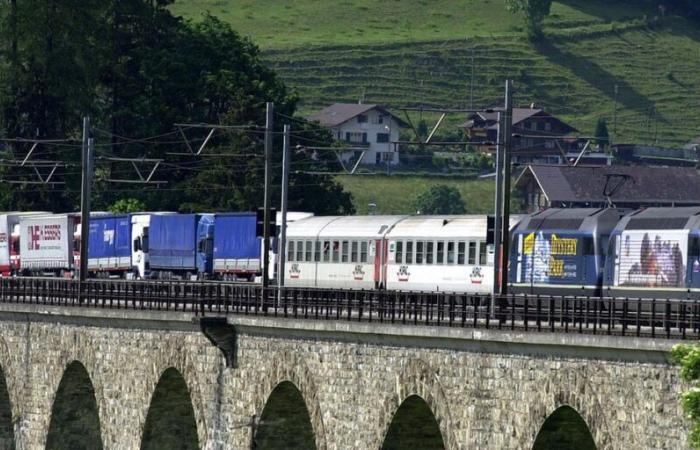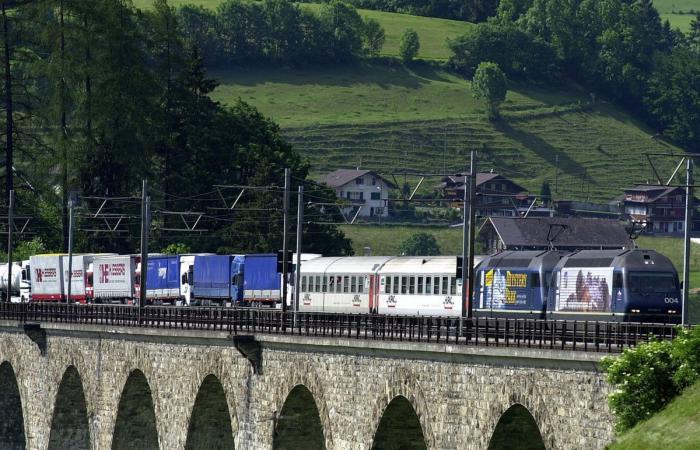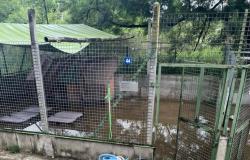Transport of goods –Trucks will no longer be able to cross the Swiss Alps via the rail from 2026
In the absence of means, the Swiss ferrout will disappear. For what alternatives?

Posted today at 3:59 p.m.

A rolling road train on the viaduct near Futigen: trains were a symbol of the transfer policy – it is now necessary to end it by the end of the year.
Photo: Peter Schneider (Keystone)
Subscribe now and take advantage of the audio reading function.
- The operator Ralpin prematurely stops his ferrout service.
- Massive cancellations of trains led to a loss of 2.2 million francs.
- The transit of trucks through the Alps has recently increased to reach 960,000 journeys, very far from the objectives of the Alps initiative accepted by the population in 1994.
The rule in Switzerland is as follows: trucks must be transferred from road to rail. But from next year, the opposite should occur. Indeed, the transport of trucks by rail will cease at the end of 2025, three years earlier than initially planned. This was announced on Monday the operator Ralpin.
Since the 1990s, the rail transport service has been the symbol of Swiss policy transfer of goods traffic across the Alps. Since the adoption of the Alps Initiative in 1994, the mandate to transfer the goods from Road to Rail to be anchored in the Federal Constitution. The rolling road has been a visible sign for this policy for years: on the border, trucks are on special wagons, cross Switzerland by train, while drivers take a break in an accompaniment wagon. This alternative is soon to be part of the past.
According to Ralpin, this service is deleted due to numerous restrictions on the rail network. In question, planned sites or unpredictable events that have led to many cancellations. In 2024 alone, around 10% of the trains had to be removed, which led to a loss of 2.2 million francs. In the first quarter of 2025, the number of trips fell compared to 2024, going from more than 1000 to just 800 trains.
Two years ago, the Parliament had nevertheless decided to continue the exploitation of the rolling road until 2028. The Confederation made 106 million francs available for this purpose.
The transfer to the rail is enshrined in the Swiss Constitution
The Alps initiative expressly requests the transfer to the rail of freight transport across the Alps. Despite the insistent warnings of the Minister of Transport of the time, Adolf Ogi, the people approved the initiative at 52% in February 1994. Heavyweight fee linked to services (RPLP), construction of the two basic tunnels of the Gothard And from the Lötschberg as well as the transport of goods by the Rolling Chaussé are the results of this popular decision.
Switzerland has set itself the aim of reducing the number of heavy goods vehicles across the Alps to 650,000 per year. Thanks to measures such as RPLP, investments of several billion in rail infrastructure, market opening and international cooperation, rail recently represented 75% of goods transport across the Alps – a record value in European comparison. According to statistics from the Federal Transport Office (OFT), the number of trucks crossing the Alps has continuously dropped for years from 2000. But in the past four years, it has increased again. Lately 4.8% to reach 960,000 trips. The objective of 650,000 journeys is increasingly felling.
Number of trucks on the road since 2000. The target of 650,000 trips is increasingly felling.
The criticism of the Alps initiative with regard to this recent decision is clear. The organization, which today bears the name of Pro Alps, the written in a press release: “The premature judgment of the rolling road is a consequence of political negligence – from 2026, a new flood of trucks threatens transit traffic across the Alps.” According to her, the Federal Council must finally improve the framework conditions for rail transport of goods. Pro Alps requests a transition strategy, for example by means of a drop in prices for furrows.
A “disturbing decision” for the climate and transport
In addition, during the next revision of the RPLP, road transport companies should participate more in real costs. “While the transport of goods on rail is faced with high costs, transit traffic on the road benefits from indirect subsidies,” explains Silvan Gnos, political leader within Pro Alps.
The union of critical transport staff also this decision: on the one hand, the staff is concerned and, on the other hand, the judgment is worrying in terms of transport policy and climate policy. The premature judgment of the rolling road means “a massive transfer of traffic goods to the road – a considerable decline for climate policy”, writes the union, shocked that the decision also comes from the railway company BLS as well as SBB.
Questioned on this subject, the Federal Transport Office says it regrets the premature judgment of the ferrouping service, but shows understanding in the face of economic difficulties. The OFT examines how as many transportation as possible could continue to be carried out by the rail. It is notably planned to use the means released to promote unaccompanied goods traffic on rail.
“Latest news”Do you want to stay at the top of the info? “24 Hours” offers you two meetings per day, directly in your email box. To not miss anything of what is happening in your canton, Switzerland or in the world.
Other newslettersConnect
Did you find an error? Please report it to us.
0 comments










